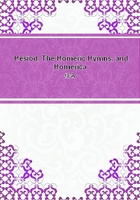
第77章 THE HOMERIC HYMNS(19)
(ll. 155-167) So speaking, he caught her by the hand. And laughter-loving Aphrodite, with face turned away and lovely eyes downcast, crept to the well-spread couch which was already laid with soft coverings for the hero; and upon it lay skins of bears and deep-roaring lions which he himself had slain in the high mountains. And when they had gone up upon the well-fitted bed, first Anchises took off her bright jewelry of pins and twisted brooches and earrings and necklaces, and loosed her girdle and stripped off her bright garments and laid them down upon a silver-studded seat. Then by the will of the gods and destiny he lay with her, a mortal man with an immortal goddess, not clearly knowing what he did.
(ll. 168-176) But at the time when the herdsmen driver their oxen and hardy sheep back to the fold from the flowery pastures, even then Aphrodite poured soft sleep upon Anchises, but herself put on her rich raiment. And when the bright goddess had fully clothed herself, she stood by the couch, and her head reached to the well-hewn roof-tree; from her cheeks shone unearthly beauty such as belongs to rich-crowned Cytherea. Then she aroused him from sleep and opened her mouth and said:
(ll. 177-179) `Up, son of Dardanus! -- why sleep you so heavily?
-- and consider whether I look as I did when first you saw me with your eyes.'
(ll. 180-184) So she spake. And he awoke in a moment and obeyed her. But when he saw the neck and lovely eyes of Aphrodite, he was afraid and turned his eyes aside another way, hiding his comely face with his cloak. Then he uttered winged words and entreated her:
(ll. 185-190) `So soon as ever I saw you with my eyes, goddess, Iknew that you were divine; but you did not tell me truly. Yet by Zeus who holds the aegis I beseech you, leave me not to lead a palsied life among men, but have pity on me; for he who lies with a deathless goddess is no hale man afterwards.'
(ll. 191-201) Then Aphrodite the daughter of Zeus answered him:
`Anchises, most glorious of mortal men, take courage and be not too fearful in your heart. You need fear no harm from me nor from the other blessed ones, for you are dear to the gods: and you shall have a dear son who shall reign among the Trojans, and children's children after him, springing up continually. His name shall be Aeneas (27), because I felt awful grief in that Ilaid me in the bed of mortal man: yet are those of your race always the most like to gods of all mortal men in beauty and in stature (28).
(ll. 202-217) `Verily wise Zeus carried off golden-haired Ganymedes because of his beauty, to be amongst the Deathless Ones and pour drink for the gods in the house of Zeus -- a wonder to see -- honoured by all the immortals as he draws the red nectar from the golden bowl. But grief that could not be soothed filled the heart of Tros; for he knew not whither the heaven-sent whirlwind had caught up his dear son, so that he mourned him always, unceasingly, until Zeus pitied him and gave him high-stepping horses such as carry the immortals as recompense for his son. These he gave him as a gift. And at the command of Zeus, the Guide, the slayer of Argus, told him all, and how his son would be deathless and unageing, even as the gods. So when Tros heard these tidings from Zeus, he no longer kept mourning but rejoiced in his heart and rode joyfully with his storm-footed horses.
(ll. 218-238) `So also golden-throned Eos rapt away Tithonus who was of your race and like the deathless gods. And she went to ask the dark-clouded Son of Cronos that he should be deathless and live eternally; and Zeus bowed his head to her prayer and fulfilled her desire. Too simply was queenly Eos: she thought not in her heart to ask youth for him and to strip him of the slough of deadly age. So while he enjoyed the sweet flower of life he lived rapturously with golden-throned Eos, the early-born, by the streams of Ocean, at the ends of the earth; but when the first grey hairs began to ripple from his comely head and noble chin, queenly Eos kept away from his bed, though she cherished him in her house and nourished him with food and ambrosia and gave him rich clothing. But when loathsome old age pressed full upon him, and he could not move nor lift his limbs, this seemed to her in her heart the best counsel: she laid him in a room and put to the shining doors. There he babbles endlessly, and no more has strength at all, such as once he had in his supple limbs.
(ll. 239-246) `I would not have you be deathless among the deathless gods and live continually after such sort. Yet if you could live on such as now you are in look and in form, and be called my husband, sorrow would not then enfold my careful heart.
But, as it is, harsh (29) old age will soon enshroud you --ruthless age which stands someday at the side of every man, deadly, wearying, dreaded even by the gods.